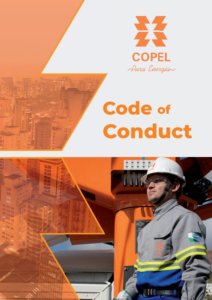Integrity
The principles that guide Copel’s Integrity actions are based on the Company’s values, on the Code of Conduct and on the Global Compact of the United Nations (UN).
The actions carried out by the responsible areas are compiled in the Integrity Program, whose purpose is the correct treatment of ethical and conduct deviations and mainly the implementation of anti-corruption measures.
As fundamental points for the good performance of the Program, the Code of Conduct and the Denouncement Channels are highlighted.

Integrity Policy
Code of Conduct
The Code of Conduct applies to all employees (regardless of their role or hierarchical position), administrators (members of the Board of Directors and Executive Board), members of the Supervisory Board and members of statutory committees, as well as interns, suppliers, service providers services and outsourced. This Code of Conduct covers Copel Holding, wholly-owned subsidiaries, affiliates, controlled companies and jointly-controlled companies.
Integrity Program
Copel’s Integrity Program has as its purpose the correct treatment of ethical and conduct deviations and mainly the implementation of anti-corruption measures adopted for the prevention, detection and remediation of acts that are harmful to the company, involving, for example, the occurrence of bribery, kickbacks, conflicts of interest, fraud in bidding processes and payments, among others.

Compliance
As a result of the high level of regulation of the electricity market and the high degree of transparency required as a result of going public on the Stock Exchanges, even before the determinations contained in the specific legislation, Copel had already instituted rigorous mechanisms of internal controls, norms and procedures that, among other aspects, aim to ensure compliance with the established rules and the prevention of acts of corruption.

Internal Controls
Copel, a mixed capital company that is part of the State Indirect Administration, is also a publicly traded company, with shares traded on stock exchanges, subject to compliance with an extensive set of laws and regulations, domestic and foreign, among them to formally constitute a risk management, compliance, and internal controls structure, following the criteria established in the COSO 2013 framework.

Audit
Auditing is an independent activity that aims to evaluate and improve the effectiveness of processes, risk management, control and governance of the organization.
Aligned to the best Corporate Governance practices and legal determinations, Copel has a specific structure aimed at Internal Audit works and also with the external and independent evaluation of a company specialized in audit work – External Audit.

Political Donation
As provided for in Law No. 9,096/95, in Article 31,
“Art. 31. The party is prohibited from receiving, directly or indirectly, in any form or pretext, monetary or estimable contributions or assistance in cash, including through advertising of any kind, from public entities and legal entities of any nature, except for the allocations referred to in art. 38 of this Law and those coming from the Special Campaign Financing Fund;”





